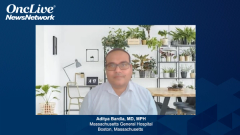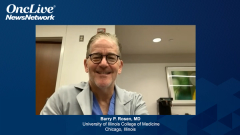
Other Clinical Studies on ctDNA Use in Breast Cancer
Shared insight on how clinical trial data behind circulating tumor DNA in breast cancer may affect future treatment strategies.
Episodes in this series

Transcript:
Aditya Bardia, MD, MPH: Detection of ctDNA (circulating tumor DNA) in the adjuvant setting is an exciting area of research. There are a number of ongoing studies in this space—both studies to look at the frequency of detection, impact, and outcomes, but also intervention studies. For example, in hormone receptor-positive breast cancer, there are ongoing trials looking at the efficacy of a CDK4/6 inhibitor in patients who have detectable ctDNA. In the US, the study wings leader and there are similar studies in the UK as well. For patients with triple-negative breast cancer, there was a study presented by Nick Turner, MD, PhD, and his team in the San Antonio Breast Cancer Symposium. They looked at the efficacy of an immunotherapy agent pembrolizumab in patients who had detectable ctDNA. The number of patients with detectable ctDNA was small. Then the study had to close early because of the COVID-19 pandemic and other reasons. But the study provided proof of principle that you can detect ctDNA. What was interesting from the study was that a number of patients who had ctDNA detected also had radiological evidence of metastatic disease. For subsequent studies, it provides an important proof of principle point, which is that if you are designing a study with ctDNA and a patient has detectable ctDNA, it's important to do radiological scans to confirm that the patient does not have radiological evidence of metastatic disease. The other thing that was interesting from that study was that use of single-agent immunotherapies are unlikely to be very effective in this setting. There was only 1 patient who had declined a ctDNA test. Others did not, with the use of adjuvant immunotherapy as a single agent. Thus, we likely need other interventions in this space. And there are ongoing plan studies to look at novel agents in this MRD [minimal residual disease] space. Which will be exciting, because if effective, that would delay the evidence of metastatic disease and put potentially even cure, additional patients’ cell, which is what we look for with our adjuvant therapies - is to increase the cure rate.
Barry Rosen, MD: An interesting study that was just presented at the San Antonio Breast Cancer Symposium incorporated a follow-up of the I-SPY 2 trial (NCT01042379), which was first published last year with respect to doing circulating tumor DNA testing before initiating neoadjuvant chemotherapy, during neoadjuvant chemotherapy, and following chemotherapy. Now expanding that to following after surgery, Dr Priyanka Sharma and her colleagues at The University of Kansas presented the I-SPY 2 data at San Antonio, and what we found is that looking at pathologic response after surgery, we know that our goal is to find a PCR, a pathologic complete response. But what we found from the I-SPY 2 data looking at ctDNA is there's a subset of patients who don't have a PCR who still have a prognosis every bit as good as patients who did have a PCR; in other words, those patients who have an elevated ctDNA prior to treatment and quickly go to 0 after initiation of treatment have a prognosis every bit as good as patients with a PCR. Thus, there's a subset of patients who still have residual cancer after surgery who may not need further chemotherapy, and this is actually very complementary to what we do now postoperatively, looking at RCB or residual cancer burden scores. Perhaps incorporating the ctDNA results with the RCB scores will be very complementary and make this an even more powerful test for making treatment decisions after surgery in our neoadjuvant patients.
Transcript edited for clarity.








































